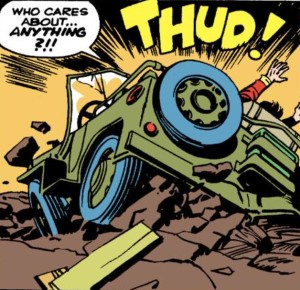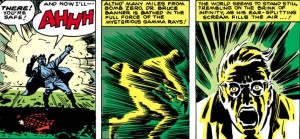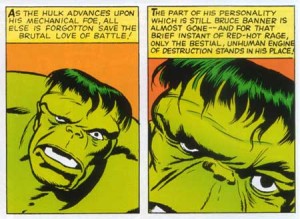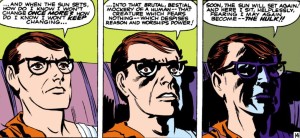 Thought I’d try something a little different from the usual here’s-what-I-read-and-here’s-why-I’m-a-bad-person-for-not-liking-it capsule reviews—I’m going to just give you my take on a character. Or a concept. Something that might not be tied down to what I’m currently reading.
Thought I’d try something a little different from the usual here’s-what-I-read-and-here’s-why-I’m-a-bad-person-for-not-liking-it capsule reviews—I’m going to just give you my take on a character. Or a concept. Something that might not be tied down to what I’m currently reading.
So: The Hulk. Here are a couple of things about The Hulk. (Spoilers: at some point, I’ll probably just call him Hulk.)
He needs his pants.
You’ve heard the jokes about the Hulk’s pants. Maybe you’ve made jokes about the Hulk’s pants. I don’t blame you, I’m sure I’ve done the same. (Though either middle age or protective hysteria is preventing me from remembering exactly when.) But what’s truly great about The Hulk’s pants is they are not part of a superhero costume, or a uniform. Hulk’s pants are regular pants torn to hell: they give him a visual identity closer to a car crash victim than to Superman. The torn pants are a visual reminder that, at his core, The Hulk is a casualty. He’s a tragedy, not a triumph.
He is more Jack Kirby’s The Hulk to me than Stan Lee’s The Hulk.
This is the first of many warning flags that mark me as the essayistic equivalent of an unreliable narrator. (I believe the technical term is “misinformed.”) Stan Lee wrote more Hulk stories than Kirby drew and The Hulk, especially, is a character of accretion: it takes a suprisingly long time before some of The Hulk’s most best known qualities—Banner turns into The Hulk when angry or stressed out; the madder Hulk gets, the stronger Hulk gets; The Hulk, far at the forefront of modern celebrity, talks about himself in the third person—get attached to the character. And not only is the tone of The Hulk consistent during The Hulk’s tenure in Tales to Astonish when Lee’s writing it, the plots stay more or less of a type.
Left to his own devices, Lee is more than happy to break out a Red spy operating in secret, with a plan to discredit the hero and sabotage the otherwise unbeatable might of the U.S. military, while the female love interest tears up and wrings her hands. Reading early isues of Lee and Kirby’s Thor is intriguing because it feels like you’re watching Kirby and Lee wrestle the character out of one another’s hands: a story will start in Asgard but end up in the mountains of Red China, Jane Foster’s roommate is actually a colonizer from Rigel-3, but the focus is still on that weepy old soap opera.
That’s actually an asset, mind you. It’s part of Thor’s spectacularly loopy charm as issues stretch to the ends of the galaxy then yo-yo back to the flower shop of Granny Gardenia. But with The Hulk, no matter how breathtaking Kirby or Ditko or Buscema pace it, it’s yet another commie spy, yet another tearful scene with Betty Ross, yet another scene of Rick Jones dutifully running about waving his arms. It all works pretty well, especially in ten page chunks (and especially compared to Giant-Man, the other ten pager for part of the run in Tales To Astonish). I think it’s the strongest work you see Stan do when not fully propped up by Kirby, Ditko, or Romita.
But. The Hulk is still Jack Kirby’s The Hulk to me. It is my selfish assertion and you’ll probably never argue me out of it.
To Be All You Can Be, or Not To Be.
Stan Lee and Jack Kirby both served in World War II.: Lee as a playwright, Kirby as a Combat Infantryman. Kirby earned two battle stars, fought in the battle of Bastogne, and almost got both his legs amputated. Lee wrote film strips and training manuals.
The Hulk’s origin is: Dr. (Robert) Bruce Banner saves teenager Rick Jones from Banner’s brainchild, the Gamma Bomb. In exchange for rescuing a callow teenager, Banner’s life is fucked up irreparably: a lifetime of black-outs, angry fights, stuff hidden from the people closest to him. That’s the story of a lot of guys who came back from World War II, the story of the ones who didn’t write training manuals and film strips.
 For the majority of his time in print, The Hulk is closely tied to the military—it created him and it wants to destroy him. If peacable Banner and violent Hulk are dark twins, then the military, as personified by General “Thunderbolt” Ross, is yet another sibling or maybe a parent. Like Banner, the military wants peace; like The Hulk, it is quick to lash out. Ross, in fact, believes about Banner and Hulk what each believe about the other—he thinks The Hulk must be destroyed, and he believes Banner to be spineless and weak.
For the majority of his time in print, The Hulk is closely tied to the military—it created him and it wants to destroy him. If peacable Banner and violent Hulk are dark twins, then the military, as personified by General “Thunderbolt” Ross, is yet another sibling or maybe a parent. Like Banner, the military wants peace; like The Hulk, it is quick to lash out. Ross, in fact, believes about Banner and Hulk what each believe about the other—he thinks The Hulk must be destroyed, and he believes Banner to be spineless and weak.
Over the years, the military has been replaced by shadowy government forces, or SHIELD (not that there’s much of a difference), or even other superheroes, and all of those choices are understandable in different ways and for different reasons. There’s a very good case to be made that once the draft ended in 1973, this strange form of resonance I’m talking about was over for the Hulk.
Now he could be just a superhero who scared the crap out of little kids (and so was strangely alluring to them). He still has a lot of resonance as simply the avatar of anger, as the guy who wins simply by willing to be angrier than anyone else. (It’s no wonder social media went through an infestation of parody Hulk accounts.) In a way, The Hulk is simply the logical, kinda hilarious extension of the hero who wins against the stronger, more resourceful villain simply because he has an unbeatable fighting spirit.
 And there is something to be said for a rip-roaring Hulk fight, especially if you’ve got an artist who is really good at scaling things up while keeping the feeling of mass, of making sure everything doesn’t feel feather light. The Hulk’s poor posture is another thing I love about the character, not just because my own posture is especially terrible (although it is) but because he is so dense with muscle he can barely straighten up under his own weight.
And there is something to be said for a rip-roaring Hulk fight, especially if you’ve got an artist who is really good at scaling things up while keeping the feeling of mass, of making sure everything doesn’t feel feather light. The Hulk’s poor posture is another thing I love about the character, not just because my own posture is especially terrible (although it is) but because he is so dense with muscle he can barely straighten up under his own weight.
But to me, the best stuff about The Hulk is Jack Kirby. Maybe not the way Kirby and The Hulk actually interacted in real life, but the way the two characters share space in my imagination.
In my imagination, Jack Kirby is a devoted family man, a kind and soft-spoken man. But in his comics, there are always new and terrifying war machines clawing up through the ground or arcing over the horizon. Men are always pointing, mouths open, captured at the second before obliteration. Dressed in rags, clothes torn, a man stumbles through the wrecked landscape, a hand to his face, unsure of what’s happened except that it could not have happened without him. This man is always hated. He is always hunted. But in order for the people he loves to be safe, he has to become a nightmare, a cauldron of violence. When it’s over, he stumbles alone into the horizon, knowing that soon it will all start again. Again, and again, and again.
Puffing thoughtfully on a cigar, caught halfway between the real world and his dream world, halfway between breakfast and lunch, Jack Kirby draws a page of a man hounded by the forces of war, and then moves onto the next. Draws that one and moves on to the next. When he stops, he goes out to his wife and children, and they sit around a table together and laugh. And then he goes back to his drawing board, ready to create again. Again, and again, and again.



Really dug this little essay. I’m wondering who these Hulk pants haters are, though. I’ve not heard this critique, but it strikes me that the alternatives could only be worse. Has Banner/Hulk ever worn a costume, maybe a Reed Richards unstable molecules dealy – what a terrible idea. There would be something to buck naked Hulk trudging along with his mangled Hulk dick swaying in step, but it’s Marvel comics so you would only end up with tree leaves and shadows and maybe eventually a long, skinny balloon-dog-making balloon, like in the end of Austin Powers. It would be a joke. No, Hulk must have pants.
FWIW, I agree completely with the idea of The Hulk being essentially Jack Kirby’s The Hulk. Or I should say, I agree in principle (having not read Hulk outside of a few issues drawn by Ditko). For the 99.999% of the world who haven’t read Peter David’s Hulk run, the Hulk is not so much a character as he is a visual: a frail, ordinary man transfiguring into a great green force of nature, which while being monstrous remains distinctly human, as a reminder of the violence within. That’s all there in the drawings. If I had to give a writer credit for contributing to the mythos, it would be whoever came up with the phrase “Hulk smash!” And even that only reinforces what is already present in the visual.
I think this is true of most of the old superheroes, even ones which were better defined from the outset than Hulk. Take Spider-Man, for instance. Personally, I love the Spider-Man character. I’ve invested an obscene and frankly embarrassing amount of time and money into that character. I’ve read literally thousands of comics starring Peter Parker. I love the ideas of power and responsibility, of doing the right thing at great personal cost, of double identities, of thrill-seeking, and of sacrificing relationships to pursue the thing that excites you. These are all more or less writerly contributions. Yet, when I reflect on what keeps me coming back – why this character over others with similar writerly affects – I’m lead to the visual, to Ditko. I love the way Spidey moves, the way he fights. I can watch it endlessly. That is at least in part what I’m doing buying these comics still after so many years, just trying to get my kick of Spider-Man swinging around, contorting his body in impossible ways.
So no, I don’t think it’s ridiculous at all to find your Hulk inextricably linked with Kirby. Your autobio take on the character is fascinating and novel, but in the broad strokes of identifying with key images from Hulk, rather than storyline or characterization, that has to be the case for most people. I mean think of all the clamor for a Wonder Woman movie – most of that crowd has never heard the names “Diana Prince” or “Themyscira.” They like Wonder Woman’s look and what she represents. And returning to the Marvel characters, they were created by really, really great artists at the tops of their respective games (and in Ditko’s case, a turning point of his life; I think he started reading Rand right around 1964). Of course those images are going to be imbued with a special power.
Cass: I keep trying to piece together a coherent reply to this exceptional piece. Gonna just have to go with “yeah, very well said.” (Esp. the stuff about Peter Parker/Spidey which is super-resonant, although the older I get, the more I appreciate Ditko’s interpretation of PP just as much as Spidey. I’ve been telling myself I’d get a Ditko Pete/Spidey “spidey-sense tingling” tattoo for something like two decades now.)
Have you checked out the Hulk mini w/art by Corben? It’s on Marvel Unlimited… Some of the best Hulk drawing ever. Bachalo would be great for Hulk too. But yeah, Hulk lives on the graces of good visuals. As good a job as Peter David did, he was abetted by a murderer’s row of drawers (McFarlane, Keown, and the too often overlooked Purves).
I remember that mini/it’s the two issue one he did with Azzarello? Right around the time they did Cage?
I wish I liked Azzarello more b/c I don’t think he’s worked with a dud artist yet.
HI Jeff. I really enjoyed this article. Have you thought about other topics that you might want to write about in a similar vein. I know the Whatnaughts are Kirbyphiles. How about tackling Kirby’s little known 2001 adaptation and the short lived 2001 Marvel series.
That would be a terrific subject, Paul. I’d read most of the issues relatively recently, too. The trick would be saying something fresh about it that didn’t get covered when Graeme and I talked about in…. ep. 101, maybe?
Thanks for the suggestion! It’s in the hopper.
Hey Jeff – Your Hulk as Kirby theory really blew my mind! And it may have started a new appreciation for the character. I guess I’ve sort of written the Hulk off as an atomic Jekyll & Hyde. But I like your Kirby/Hulk idea. The more I think about it Hulk and Banner’s problematic relationship with the military and bureaucratic structure is pretty interesting. I also like the idea of Kirby funneling his feelings of uncontrollable anger into the Hulk.
My own grandfather would never talk about his war experiences in Europe, but I’ve heard the story that when he came back he shaved his head and became a vegetarian. He hung out in North Beach in the 50’s and eventually dropped out and lived in a small village in Mexico for most of my childhood, taking up a his own pseudonym of sorts.
What do you think of the Hulk pleading to be left alone? Beside wrestling with his drawing table, do you think it was Kirby’s escape too? Was it where he could be “left alone”?
Thanks for this, Leef! I enjoyed writing my post, but I enjoyed reading about your grandfather even more. He sounds like a fascinating guy, and I can only imagine what he was trying to process.
And yeah, Hulk always wanting to be left alone–that seems pretty essential too, doesn’t it? His ambivalence about his own aloneness is pretty much what you hear from writers, artists, and other creative types who have to lock themselves away (kind of like Banner in his New Mexico bunker) in order to survive…